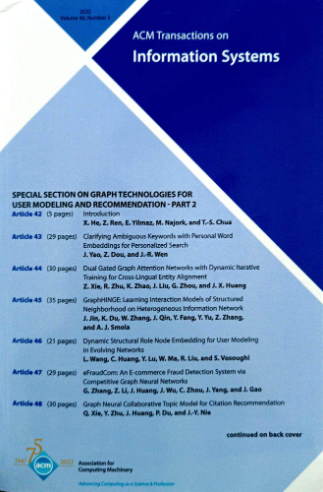AdaGIN:用于点击率预测的自适应图形交互网络
IF 5.4
2区 计算机科学
Q1 COMPUTER SCIENCE, INFORMATION SYSTEMS
引用次数: 0
摘要
推荐系统中点击率(CTR)预测的目标是有效利用输入特征。然而,现有的点击率预测模型面临三个主要问题。首先,许多模型使用基本的特征组合方法,导致噪音和准确性降低。其次,没有考虑不同交互顺序中特征的不同重要性,从而影响了模型的性能。第三,目前的模型架构难以捕捉来自不同语义空间的不同交互信号,导致性能不达标。为了解决这些问题,我们提出了自适应图交互网络(AdaGIN),其中包含基于图神经网络的特征交互模块(GFIM)、多语义特征交互模块(MFIM)和基于负反馈的搜索(NFS)算法。GFIM 明确聚合特征之间的信息并评估其重要性,而 MFIM 则捕捉来自不同语义空间的信息。NFS 使用负反馈来优化模型的复杂性。实验结果表明,AdaGIN 在大规模公共基准数据集上的表现优于现有模型。本文章由计算机程序翻译,如有差异,请以英文原文为准。
AdaGIN: Adaptive Graph Interaction Network for Click-Through Rate Prediction
The goal of click-through rate (CTR) prediction in recommender systems is to effectively work with input features. However, existing CTR prediction models face three main issues. First, many models use a basic approach for feature combinations, leading to noise and reduced accuracy. Second, there is no consideration for the varying importance of features in different interaction orders, affecting model performance. Third, current model architectures struggle to capture different interaction signals from various semantic spaces, leading to sub-optimal performance. To address these issues, we propose the Adaptive Graph Interaction Network (AdaGIN) with the Graph Neural Networks-based Feature Interaction Module (GFIM), the Multi-semantic Feature Interaction Module (MFIM), and the Negative Feedback-based Search (NFS) algorithm. GFIM explicitly aggregates information between features and assesses their importance, while MFIM captures information from different semantic spaces. NFS uses negative feedback to optimize model complexity. Experimental results show AdaGIN outperforms existing models on large-scale public benchmark datasets.
求助全文
通过发布文献求助,成功后即可免费获取论文全文。
去求助
来源期刊

ACM Transactions on Information Systems
工程技术-计算机:信息系统
CiteScore
9.40
自引率
14.30%
发文量
165
审稿时长
>12 weeks
期刊介绍:
The ACM Transactions on Information Systems (TOIS) publishes papers on information retrieval (such as search engines, recommender systems) that contain:
new principled information retrieval models or algorithms with sound empirical validation;
observational, experimental and/or theoretical studies yielding new insights into information retrieval or information seeking;
accounts of applications of existing information retrieval techniques that shed light on the strengths and weaknesses of the techniques;
formalization of new information retrieval or information seeking tasks and of methods for evaluating the performance on those tasks;
development of content (text, image, speech, video, etc) analysis methods to support information retrieval and information seeking;
development of computational models of user information preferences and interaction behaviors;
creation and analysis of evaluation methodologies for information retrieval and information seeking; or
surveys of existing work that propose a significant synthesis.
The information retrieval scope of ACM Transactions on Information Systems (TOIS) appeals to industry practitioners for its wealth of creative ideas, and to academic researchers for its descriptions of their colleagues'' work.
 求助内容:
求助内容: 应助结果提醒方式:
应助结果提醒方式:


